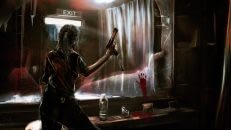To The Moon Review
Dreams are often most profound when they seem the most crazy. Such as Johnny’s impulsive wish of going to the moon, despite not being able to give reasons why. Perhaps it is dementia, or the culmination of a life lived full of regret; but Johnny’s last dying breaths are spent upon calling the people capable of delivering the impossible. To live our dreams. It sounds pretentious at best, but nothing will prepare you for the magnitude of the journey in To The Moon. Grab the nearest box of tissues.
To The Moon is hard to define. It appears to be a classic JRPG: speech bubbles, isometric view, emoticons, the lot. It’s not though, in fact, it barely contains any notion of what people would recognise as gameplay at all. You play as Dr. Rosalene and Dr. Neil of the Sigmund Corporation as they work their way backwards through Johnny’s life to ensure his dream is realised. In many ways, To The Moon is as emotional and complex an idea as Eternal Sunshine of the Spotless Mind – travelling through memories, dreams and given that it is all operated through a computer program, the inevitable “Morpheus?” joke pops up when answering a ringing phone. The game’s developer, Kan Gao (who I have huge respect for), wishes for it to be treated simply as “a vessel for storytelling”. This focus on weaving a narrative over delivering gameplay will seem strange to some people. In effect, the game is about as interactive as a novel, with clicking through dialogue replacing the act of turning the page.
To shun the game for this would be utterly foolish though. Those who wept through the emotional sub-plots of Lost Odyssey will understand what chord To The Moon chimes with. And then some. Ensuring that the focus on the plot is not interrupted by any pointless opportune gameplay moments was the right decision. This is proved in the first act when the player travels back through the memories at a fast rate. To do so, memory links have to be found in each memory to activate the memento which provides access to the next memory. The location exploring and quick tile-based puzzle that has to be solved to activate the mementos becomes quite repetitive rather quickly. At this point the game is yet to blossom; the comedic moments provided by Dr. Neil sometimes verge on spoiling the beauty of a memory as remarked upon by his colleague. In all honesty, it feels as if you are rushed through Act 1, which is understandable considering the doctors want to reach Johnny’s childhood memories before he passes away. However, it becomes hard to engage with the characters and draw any emotion from what is clearly an upsetting tale about a man and his wife struggling with the toils of her illness. Conclusion? Gameplay only goes toward taking away from To The Moon, so it is fortunate that the following acts do not make this mistake and allow the characters and plot to come into their own.
With the background of Act 1 established, the consequent acts move from a pure comedy of errors into some of the most heart-breaking scenes I have ever witnessed in a computer game, or indeed a piece of entertainment. I feel the need to emphasise the ‘I’ in that sentence, as the game actually hit a raw nerve by coinciding with something very upsetting in my own life. Revealing what it is specifically would be to tarnish its execution and overwhelming impact of the surprising plot twist. That aside, To The Moon certainly steps up its game after the shaky start. Much of this can be attributed to the game’s soundtrack which never falters, not even once. Without it, the game would lose its entire purpose, its meaning, its impact. The song of the game’s title is particularly tear-inducing every time it gently glides across the game’s best moments, hitting a poignant high with the addition of Laura Shigihara’s hauntingly beautiful vocals. These are indescribable moments. Such beauty and raw emotion tugs at the toughest of heartstrings. I could paint an illusory picture with a high volume of grandiose adjectives right here, but they would never capably match what the game has given me.
After sitting through To The Moon my perspective was changed for a sustained period. Stumbling up from my chair I strolled across my house, my tear-stained eyes reflecting on life and my own memories. Pictures of my youth, my friends, everything was different. The people who encountered me in my enlightened state asked “Are you alright?” – their concern revealing a new layer of humanity. What I am trying to say is, To The Moon will change something in you. It will last with you forever and nothing is worth not living through this experience. What is the point in living if we cannot capture the moments that take our breath away. That push aside all the harrows of living and, even if just for a moment, make everything so beautiful, so touching. To The Moon encapsulates this. At times it will make you laugh, others you will cry. This is undoubtedly a peak in not only computer games, but in narrative storytelling as well. It is incredible. Sure this all sounds like some hyped-up drivel, like the prose of dreams. But don’t question it, instead take the time to experience To The Moon and I will meet you on the other side, my friend.
More info on To The Moon and Freebird Games can be found over at the official website, where the game can be purchased too!





